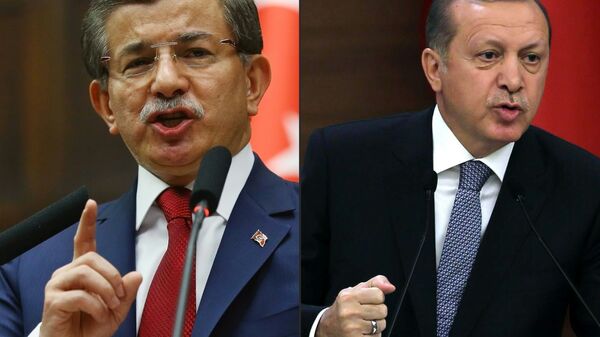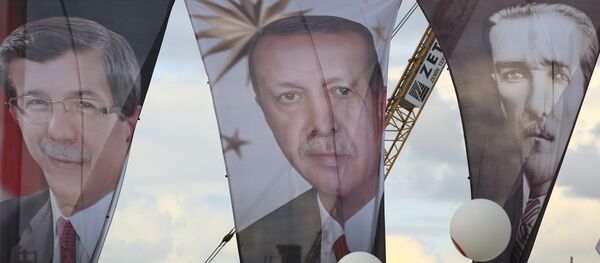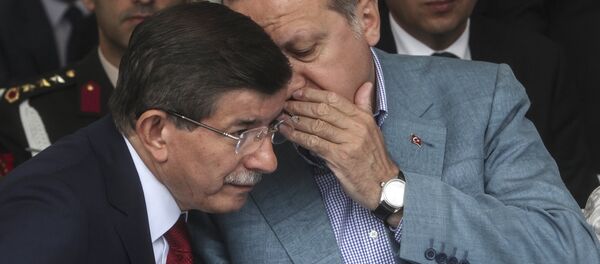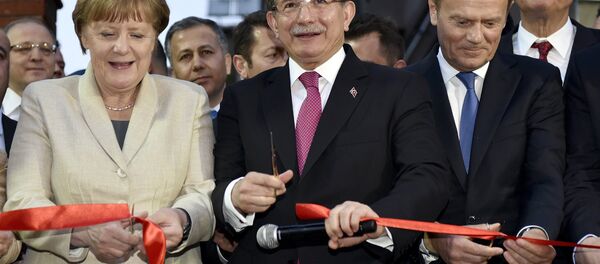The relationship between the two first deteriorated during the June 2015 parliamentary elections, when the Justice and Development Party (AKP) failed to gain enough votes to form a new government on its own.
Speculation was rife at the time that Davutoglu had called for the creation of a coalition, and even headed "intelligence negotiations" with representatives of the Republican People's Party, the Nationalist Movement Party and the Peoples' Democratic Party in the face of Erdogan insisting on early elections.
Davutoglu might be the world's first Prime Minister who could not show any reason for his sudden resignation. pic.twitter.com/JjwAp3zIIy
— NOT MY… (@meralink) 6 мая 2016 г.
The last six months have seen Davutoglu expressing his disagreement with many of Erdogan's plans, including the Turkish President's intention to transform Turkey from a parliamentary to a presidential republic, something that Davutoglu described as untimely, Melnikova said.
She quoted Turkish expert Serkan Demirtas as saying that there were quite a few differences between Erdogan and Davutoglu, which added significantly to the Turkish Prime Minister's resignation.
"In particular, the PM opposed the detention of journalists and scientists who criticized government policy, and at the same time he called for the resumption of peace talks with the outlawed Kurdistan Workers' Party (PKK) amid the ongoing army crackdown on the party," Demitras said.
Davutoglu also did not like Erdogan actively intervening in the work of the government, given that the President has no legal authority to do so.Despite the PM's disapproval, Erdogan finally nominated his son-in-law Berat Albayrak and his close associate Binali Yildirim for the posts of Minister of Energy and Minister of Transport, respectively.
"Davutoglu tried to be a normal head of government in a parliamentary republic, and he did not want to play a role of a 'pocket premier'. After all, according to the Constitution he has more rights than Erdogan," Demirtas said.
Melnikova quoted expert Ilshat Sayetov as saying that Davutoglu was a supporter of systematic reforms and opposed the creation of an authoritarian regime, repeatedly calling for the freedom of the press, the expansion of human rights and the principle of separation of powers.
"Erdogan fears the slightest signs of disagreement with him and acts on a 'to be on the safe side' basis. The process of transition to a super-presidential republic should see no obstacles, and Erdogan has decided to clean the entire field of potential competitors," Sayetov said.
The relations between the two men became further aggravated after the opposition newspaper Sozcu Gazetesi published a front-page photograph of a man who looked like Binali Yildirim in one of the casinos in Singapore. The presidentially-controlled media outlets were quick to claim that the photo being leaked to the press was the work of Davutoglu, who "wanted to tarnish the President's image and weaken his position."
Breaking: @AlMayadeenLive reporting that #Turkish PM, #Ahmet_Davutoğlu, has resigned, citing differences with #Erdogan.
— Hala Jaber (@HalaJaber) 4 мая 2016 г.
At the same time, Turkish newspapers reported about Davutoglu's possible visit to the United States in early May. Citing a source close to the Prime Minister, the Hurriet Daily News pointed out that the White House immediately confirmed Davutoglu's meeting with President Barack Obama and Vice President Joseph Biden.
Erdogan feared that upon securing Washington's support, Davutoglu would try to strengthen his political position, something that forced Erdogan to work proactively and take a step that could humiliate the Prime Minister.
When Davutoglu visited Doha, Qatar early this month, the AKP leadership hastily decided to deprive the Turkish PM of his power to appoint the heads of regions and districts, in a move that was supported by 47 of the 50 members of the AKP's board of directors. A few days later, the Turkish Prime Minister tendered his resignation, which he said was a necessity rather than his personal decision.





